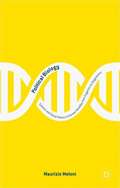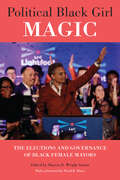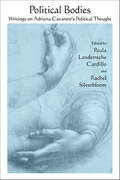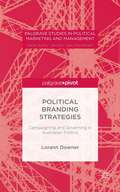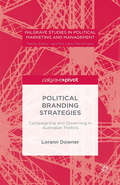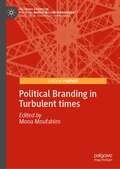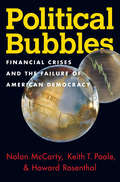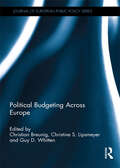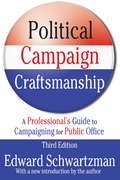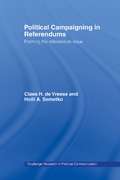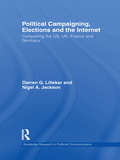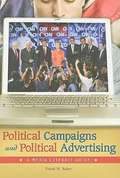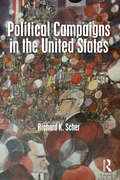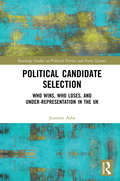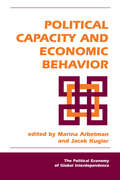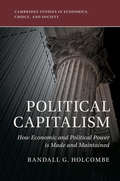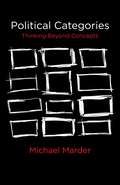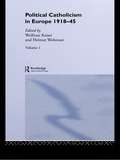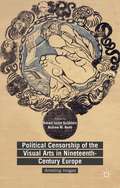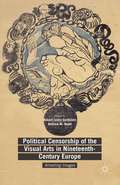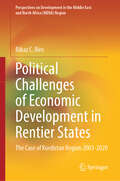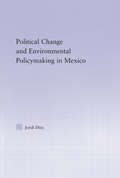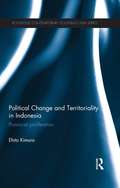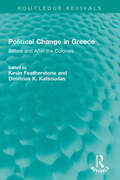- Table View
- List View
Political Biology: Science and Social Values in Human Heredity from Eugenics to Epigenetics
by Maurizio MeloniPolitical Biology.
Political Black Girl Magic: The Elections and Governance of Black Female Mayors
by Sharon D. Wright AustinPolitical Black Girl Magic explores black women’s experiences as mayors in American cities. The editor and contributors to this comprehensive volume examine black female mayoral campaigns and elections where race and gender are a factor—and where deracialized campaigns have garnered candidate support from white as well as Hispanic and Asian American voters. Chapters also consider how Black female mayors govern, from discussions of their pursuit of economic growth and how they use their power to enact positive reforms to the challenges they face that inhibit their abilities to cater to neglected communities. Case studies in this interdisciplinary volume include female mayors in Atlanta, Baltimore, Charlotte, Chicago, Compton, and Washington, DC, among other cities, along with discussion of each official’s political context. Covering mayors from the 1960s to the present, Political Black Girl Magic identifies the most significant obstacles black women have faced as mayors and mayoral candidates, and seeks to understand how race, gender, or the combination of both affected them. Contributors: Andrea Benjamin, Nadia E. Brown, Pearl K. Dowe, Christina Greer, Precious Hall, Valerie C. Johnson, Yolanda Jones, Lauren King, Angela K. Lewis-Maddox, Minion K.C. Morrison, Marcella Mulholland, Stephanie A. Pink-Harper, Kelly Briana Richardson, Emmitt Y. Riley, III, Ashley Robertson Preston, Taisha Saintil, Jamil Scott, Fatemeh Shafiei, James Lance Taylor, LaRaven Temoney, Linda Trautman, and the editor
Political Bodies: Writings on Adriana Cavarero's Political Thought (SUNY series in Contemporary Italian Philosophy)
by Paula Landerreche Cardillo; Rachel SilverbloomAdriana Cavarero has been, and continues to be, one of the most innovative and influential voices in Italian political and feminist thought of the last forty years. Known widely for her challenges to the male-dominated canon of political philosophy (and philosophy more broadly construed), Cavarero has offered provocative accounts of what constitutes the political, with an emphasis on embodiment, singularity, and relationality. Political Bodies gathers some of today’s most prominent and well-established theorists, along with emerging scholars, to contribute their insights, questions, and concerns about Cavarero's political philosophy and to put her work in conversation with other feminist thinkers, political theorists, queer theorists, and thinkers of race and coloniality. A new essay by Adriana Cavarero herself closes out the volume. Political Bodies ventures beyond the familiar boundaries of Cavarero's own writing and is a testament to the generative encounters that her philosophy makes possible.
Political Branding Strategies: Campaigning and Governing in Australian Politics (Palgrave Studies In Political Marketing And Management)
by Lorann DownerPolitical Branding Strategies.
Political Branding Strategies: Campaigning and Governing in Australian Politics (Palgrave Studies in Political Marketing and Management)
by Lorann DownerPolitical Branding Strategies tells the story of branding by the Australian Labor Party across seven years and three brands – Kevin07, The Real Julia and that of the party. Employing a new framework to understand and evaluate branding, the book offers lessons for practitioners, researchers and citizens in democracies everywhere.
Political Branding in Turbulent times (Palgrave Studies in Political Marketing and Management)
by Mona MoufahimPolitical uncertainty and instability characterise many regions around the world and, increasingly, can be observed in more established democracies. The COVID-19 pandemic, national and international tensions, and the proliferation of autocratic, chauvinist, and, at the most extreme, fascist forces around the world all contribute to turbulent political times. Such environments constitute tremendous challenges, but also opportunities for scholars to contribute to an understanding of processes in the political market, using the lens of political branding theories. Authors from various disciplinary backgrounds, including social psychology, marketing, and media and communications, provide commentaries and analyses of branding processes in different national contexts, all characterised by tensions and challenges. The topical and provocative content of the chapters, all focusing on recent political events and phenomena in the political arena, should appeal to researchers, branding practitioners, politicians, and members of the public seeking to deepen their understanding of current events and political branding concepts.
Political Bubbles: Financial Crises and the Failure of American Democracy
by Keith T. Poole Howard Rosenthal Nolan McCartyHow governmental failure led to the 2008 financial crisis—and what needs to be done to avoid another similar event Behind every financial crisis lurks a "political bubble"—policy biases that foster market behaviors leading to financial instability. Rather than tilting against risky behavior, political bubbles—arising from a potent combination of beliefs, institutions, and interests—aid, abet, and amplify risk. Demonstrating how political bubbles helped create the real estate-generated financial bubble and the 2008 financial crisis, this book argues that similar government oversights in the aftermath of the crisis undermined Washington's response to the "popped" financial bubble, and shows how such patterns have occurred repeatedly throughout US history.The authors show that just as financial bubbles are an unfortunate mix of mistaken beliefs, market imperfections, and greed, political bubbles are the product of rigid ideologies, unresponsive and ineffective government institutions, and special interests. Financial market innovations—including adjustable-rate mortgages, mortgage-backed securities, and credit default swaps—become subject to legislated leniency and regulatory failure, increasing hazardous practices. The authors shed important light on the politics that blinds regulators to the economic weaknesses that create the conditions for economic bubbles and recommend simple, focused rules that should help avoid such crises in the future.The first full accounting of how politics produces financial ruptures, Political Bubbles offers timely lessons that all sectors would do well to heed.
Political Budgeting Across Europe (ISSN)
by Christian Breunig, Christine S. Lipsmeyer and Guy D. WhittenBudgeting is a key aspect of governmental behaviour. Research on budgeting has taken various theoretical and methodological approaches, and these differences have prevented scholars from discussing their common topic. In this collection, we have gathered a group of prominent scholars to explore the intermingling of budgets and politics from an assortment of theoretical and methodological perspectives. It highlights not only the breadth of current research but also the range of what remains underexplored. This book was originally published as a special issue of the Journal of European Public Policy.
Political Campaign Craftsmanship: A Professional's Guide to Campaigning for Public Office
by Edward SchwartzmanOver one billion dollars are spent in presidential election years on an expensive art form: political campaigns. Many political observers believe that at least half that amount is wasted. But, which half? Edward Schwartzman answers that question based upon experience gained in seventy-five campaigns. "Political Campaign Craftsmanship" treats both the art and science of campaigning, describing the procedures basic to modern professional campaigning. This practical guide to campaigns covers the entire process and gives specific strategies for every phase.
Political Campaigning in Referendums: Framing the Referendum Issue
by Claes H. de Vreese Holli A. SemetkoThis book reviews the research on campaigns and elections and investigates the effects of campaigning in referendums, drawing on panel survey data, media content data, focus groups, and interviews with journalists and campaign managers. The authors argue that the media coverage not only influences public perceptions of the campaign, the referendum issue and the party leaders, but that, in a close race, it also shapes the voting and the political future of the incumbent party.The first study to investigate the dynamics and effects of a referendum campaign on politicians, media and citizens, this innovative volume will be of interest to students and researchers of political communication.
Political Campaigning, Elections and the Internet: Comparing the US, UK, France and Germany (Routledge Research in Political Communication)
by Nigel Jackson Darren LillekerThe Internet first played a minor role in the 1992 U.S. Presidential election, and has gradually increased in importance so that it is central to election campaign strategy. However, election campaigners have, until very recently, focused on Web 1.0: websites and email. Political Campaigning, Elections and the Internet contextualises the US Presidential campaign of 2008 within three other contests: France 2007; Germany 2009; and the UK 2010. In offering a comparative history of the use of the Internet as an election tool, the authors are able to test the optimistic view that the Internet is transforming elections while also mapping the role the Internet plays and performs for parties and candidates. Lilleker and Jackson offer in-depth analysis demonstrating how interactive Web 2.0 online tools, including weblogs, social networking sites and file-sharing sites, are utilised and evaluate the role of these tools in the marketing and branding of parties and candidates. Examining the interactivity between candidate, party, and voter, this important book will be of strong interest to students and scholars of political science, elections, international relations and political communication. It will be of value to those within public relations, marketing and related communication and media programmes.
Political Campaigns and Political Advertising: A Media Literacy Guide
by Frank W. BakerBaker, a media literacy consultant and author, has written this media literacy guide for general readers who want more critical insight into propaganda and spin, political advertising and the role of new media technologies in election campaigns. The author uses clear and easy-to-understand language to examine and interpret the content of media messages in print, image and multimedia forms in an objective manner. The author supplies both a timeline of the history of media in politics from 1913 to the present and a glossary of political and media terms. Annotation ©2009 Book News, Inc., Portland, OR (booknews.com)
Political Campaigns in the United States
by Richard K. ScherA Choice Highly Recommended Title—January 2017 This book is an interpretive analysis of political campaigns in America: instead of focusing on how campaigns are designed and run, it investigates the role campaigns play in our American politics, and the close symbiosis between campaigns and those politics. The text examines how campaigns are an important manifestation of how we "do" politics in this country. Hallmarks of this text include: showing how campaigns can undermine our democracy and asking how democratic they—and by extension, our politics--really are; demonstrating that the ability of the media to accurately, fairly, and deeply report on campaigns has been severely compromised, both because of the growing "distance" between campaigns and media outlets and because of the structure of "Big Media" corporate ownership and its tight relationship to "Big Money." It asks important questions about the media including: How do the media, reporters in particular, cover campaigns? What pressures and forces shape what and how they present campaigns? What is the impact of the ever-increasing chasm separating campaigns and the media? How does the close tie between corporate mainstream media and Super PAC money affect campaign coverage? How does the ability of campaigns and media to segment voters into ever-smaller slices influence how campaigns are covered? tracking the continuing growth of unregulated, private, unaccountable "dark money" in campaigns as a threat to our democratic elections and politics. Democracy rests fundamentally on transparency and accountability – sunlight – and our campaign laws and norms now allow and encourage exactly the opposite, largely because of decisions by the United States Supreme Court.
Political Candidate Selection: Who Wins, Who Loses, and Under-Representation in the UK (Routledge Studies on Political Parties and Party Systems)
by Jeanette AsheThe "secret garden of politics", where some win and others lose their candidate selection bids, and why some aspirant candidates are successful while others fail have been enduring puzzles within political science. This book solves this puzzle by proposing and applying a universally applicable multistage approach to discover the relationship between selection rules, selectors’ biases, aspirants’ attributes, and selection outcomes. Rare party and survey data on winning and losing candidates and insider views on what it takes to win a selection contest at multiple selection stages are compared and used to reveal the inner workings of the secret garden. With a primary focus on the British Labour party over several elections, the findings challenge many long-held assumptions about why some aspirant candidate types are successful over others and provides real-world and controversial solutions to addressing women’s and other marginalised groups’ descriptive underrepresentation. As such, it provides a much-needed fresh look at party selection processes and draws new conclusions as to why political underrepresentation occurs and should inform policies to remedy it. This text will be of key interest to scholars and students of gender and ethnicity in politics, political parties and candidate selection, and more broadly to the study of political elites, comparative politics, sociology, labour studies, gender, race, and disability studies, and to practitioners.
Political Capacity and Economic Behavior (The Political Economy of Global Interdependence)
by Jacek Kugler<p>Given today's heightened competition between national economies in the global marketplace, many have come to believe that government intervention is needed in order for a country to maximize its economic well-being. But to what extent can even the most capable government act to attract investment and enhance economic growth without creating or exacerbating conflicts in society—especially when unpopular measures, such as those aimed at controlling inflation and population growth, must be implemented? <p>This timely book by an international team of economists and political scientists tackles that question head on. The contributors draw on theory and empirical data to provide a framework for measuring governments' ability to gather material resources and mobilize populations. They analyze a variety of policy choices made in the United States and in other nations around the world during the past fifty years, showing how states can increase their political capacity and thereby reduce economic transaction costs and domestic resistance to government goals.
Political Capitalism: How Political Influence Is Made and Maintained (Cambridge Studies in Economics, Choice, and Society)
by Randall G. HolcombeProblems associated with cronyism, corporatism, and policies that favor the elite over the masses have received increasing attention in recent years. Political Capitalism explains that what people often view as the result of corruption and unethical behavior are symptoms of a distinct system of political economy. The symptoms of political capitalism are often viewed as the result of government intervention in a market economy, or as attributes of a capitalist economy itself. Randall G. Holcombe combines well-established theories in economics and the social sciences to show that political capitalism is not a mixed economy, or government intervention in a market economy, or some intermediate step between capitalism and socialism. After developing the economic theory of political capitalism, Holcombe goes on to explain how changes in political ideology have facilitated the growth of political capitalism, and what can be done to redirect public policy back toward the public interest.
Political Categories: Thinking Beyond Concepts
by Michael MarderWestern philosophy has been dominated by the concept or the idea—the belief that there is one sovereign notion or singular principle that can make reality explicable and bring all that exists under its sway. In modern politics, this role is played by ideology. Left, right, or center, political schools of thought share a metaphysics of simplification. We internalize a dominant, largely unnoticeable framework, oblivious to complex, plural, and occasionally conflicting or mutually contradictory explanations for what is the case.In this groundbreaking work, Michael Marder proposes a new methodology for political science and philosophy, one which he terms “categorial thinking.” In contrast to the concept, no category alone can exhaust the meaning of anything: categories are so many folds, complications, respectful of multiplicity. Ranging from classical Aristotelian and Kantian philosophies to phenomenology and contemporary politics, Marder's book offers readers a theoretical toolbox for the interpretation of political phenomena, processes, institutions, and ideas. His categorial apparatus encompasses political temporality and spatiality; the revolutionary and conservative modalities of political actuality, possibility, and necessity; quantitative and qualitative approaches to the study of political reality; the meaning of political relations; and various senses of political being. Under this lens, the political appears not as a singular concept but as a family of categories, allowing room for new, plural, and often antagonistic ideas about the state, the people, sovereignty, and power.
Political Catholicism in Europe 1918-1945: Volume 1
by Wolfram Kaiser Helmut WohnoutThis book examines the role of Catholic parties in inter-war Europe in a systematically pan-European comparative perspective. Specific country chapters address key questions about the parties' membership and social organization; their economic and social policies; and their European and international policies at a time of increasing national and ethnic conflict, and the book includes two survey chapters explaining the origins of political catholicism in 19th century Europe and comparing the parties' interwar development, and two chapters ontransnational party contacts.Along with its companion volume, Christian Democracy in Europe Since 1945, also published in 2004, students will have an abundandce of information to guide them through their studies on this fascinating subject.
Political Censorship of the Visual Arts in Nineteenth-Century Europe: Arresting Images
by Robert Justin Goldstein Andrew M. NeddIn this comprehensive account of censorship of the visual arts in nineteenth-century Europe, when imagery was accessible to the illiterate in ways that print was not, specialists in the history of the major European countries trace the use of censorship by the authorities to implement their fears of the visual arts, from caricature to cinema.
Political Censorship of the Visual Arts in Nineteenth-Century Europe: Arresting Images
by Robert Justin Goldstein Andrew M. NeddIn this comprehensive account of censorship of the visual arts in nineteenth-century Europe, when imagery was accessible to the illiterate in ways that print was not, specialists in the history of the major European countries trace the use of censorship by the authorities to implement their fears of the visual arts, from caricature to cinema.
Political Challenges of Economic Development in Rentier States: The Case of Kurdistan Region 2003-2020 (Perspectives on Development in the Middle East and North Africa (MENA) Region)
by Ribaz C. BiroThis book investigates the relationship between politics and economics in rentier states, with a particular focus on the Kurdistan Region of Iraq from 2003 to 2020. Resource-rich states face low levels of economic growth due to the various factors of corruption, weak performance of institutions, poor levels of accountability and transparency in governance, and absence of rule of law. While most previous studies of the topic focus on either the political or economic concerns, this book focuses on their interaction. The book explores the political hurdles in resource-rich states, examining to what extent this impedes economic growth through panel data from 51 rentier states from 2003 to 2020 with different political systems and different types of natural resource dependency. The insights presented in this book have wider implications for understanding and solving similar hurdles in the Kurdistan Region of Iraq and would be a valuable resource for policymakers, strategists, academics, lawmakers, and government officials in implementing sustainable development plans and reducing the negative impacts of natural resource over-reliance in rentier states.
Political Change and Environmental Policymaking in Mexico
by Jordi DiezThis book explores environmental policymaking in Mexico as a vehicle to understanding the broader changes in the policy process within a system undergoing a democratic transformation. It constitutes the first major analysis of environmental policymaking in Mexico at the national level, and examines the implementation of forestry policy in Mexico's largest rain forest, the Selva Lacandona of the state of Chiapas.
Political Change and Territoriality in Indonesia: Provincial Proliferation (Routledge Contemporary Southeast Asia Series)
by Ehito KimuraWhat makes large, multi-ethnic states hang together? At a time when ethnic and religious conflict has gained global prominence, the territorial organization of states is a critical area of study. Exploring how multi-ethnic and geographically dispersed states grapple with questions of territorial administration and change, this book argues that territorial change is a result of ongoing negotiations between states and societies where mutual and overlapping interests can often emerge. It focuses on the changing dynamics of central-local relations in Indonesia. Since the fall of Suharto’s New Order government, new provinces have been sprouting up throughout the Indonesian archipelago. After decades of stability, this sudden change in Indonesia’s territorial structure is puzzling. The author analyses this "provincial proliferation", which is driven by multilevel alliances across different territorial administrative levels, or territorial coalitions. He demonstrates that national level institutional changes including decentralization and democratization explain the timing of the phenomenon. Variations also occur based on historical, cultural, and political contexts at the regional level. The concept of territorial coalitions challenges the dichotomy between centre and periphery that is common in other studies of central-local relations. This book will be of interest to scholars in the fields of comparative politics, political geography, history and Asian and Southeast Asian politics.
Political Change in Greece: Before and After the Colonels (Routledge Revivals)
by Kevin FeatherstonePolitical Change in Greece (1987) surveys the state of politics in Greece as it joined the EEC, experienced a socialist government, and faced changes in its relations within NATO. It provides historical background explaining the changes in regimes since the Second World War, and looks at different elements in Greek politics – processes, parties, interest groups and key policy areas – outlining for each recent development the likely future state of affairs.
Political Change in Southeast Asia
by Jacques BertrandSoutheast Asia is a vast and complex region, comprising countries with remarkably diverse histories and cultures. Jacques Bertrand provides a fresh and highly original survey of politics and political change in this area of the world. Against the backdrop of rapid economic development and social transformation in several countries, he explores why some countries have adopted democratic institutions, while others have maintained stable authoritarian systems or accepted communist regimes. Bertrand presents a historically grounded account of capitalist countries and state-socialist countries, delving into the historical experience of individual countries, whilst simultaneously providing a comparative framework with which to draw parallels and foster a better understanding of the political and economic dynamics both within and between the countries. With powerful yet accessible analysis and detailed coverage, this book offers students and scholars a thorough and thought-provoking introduction to the political landscape of Southeast Asia.
